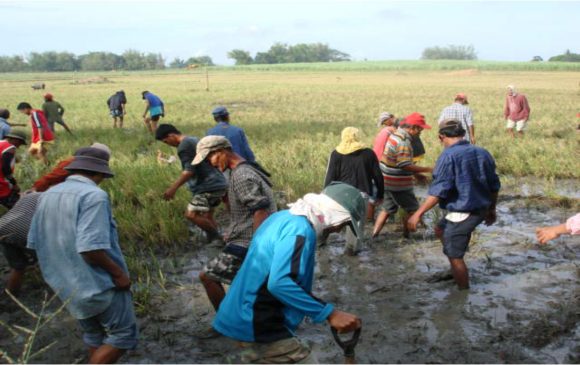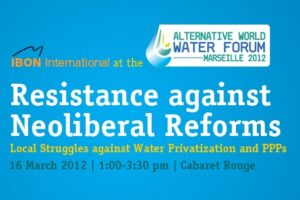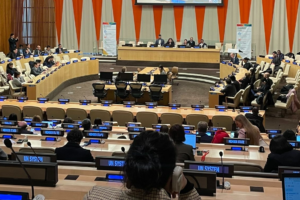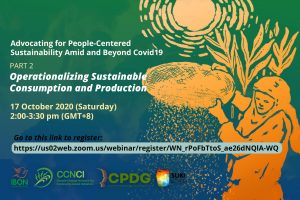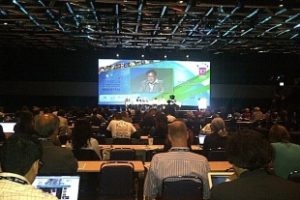Photo by Kilusang Magbubukid ng Pilipinas. Agricultural workers in the Philippines conduct collective land cultivation.
The 2020 High Level Political Forum on Sustainable Development (HLPF) and the High Level Segment (HLS) of the United Nations Economic and Social Council, is being convened on July 7-17, 2020, in an informal virtual format, under the theme “Accelerated action and transformative pathways: Realizing the decade of action and delivery for sustainable development”.
IBON International was invited to provide expertise and insight in a virtual consultation process headed by the UN Department of Economic and Social Affairs (UN DESA). The consultation was in preparation for an HLPF thematic session entitled “Responding to the economic shock, relaunching growth and sharing economic benefits and addressing developing countries’ financing challenges”. Written inputs were requested in response to the following 5 areas: (1) Policies, actions and trade offs, (2) Leaving no one behind, (3) Knowledge gaps, (4) Relevant means of implementation and global partnership for development, and (5) Science, technology and innovation.
Below is IBON International’s submission with valuable inputs from CSOs of the Asia Pacific Regional CSO Engagement Mechanism (APRCEM).
With 10 years left in the implementation of the Agenda 2030, governments must address systemic barriers with policy actions towards dismantling the neoliberal development framework which continues to channel wealth and power to an elite few while impoverishing the rest of the population, disregard human rights, and wreck the planet.
Trade and industry policies must be reoriented towards transparent, participatory and redistributive rules that are people-oriented and guided by grassroots perspectives. Liberalization and deregulation policies promoted by the World Trade Organization (WTO) and other trade and investment agreements, as well as the International Monetary Fund and World Bank (IMF-WB) have resulted in poverty for small farmers and fisherfolk, vulnerable work (1), resource grabs from indigenous peoples, and the transfer of environmentally destructive production processes to developing countries. These policies also facilitate the corporate take-over of public services and transform them to sources of profit through public-private partnerships (PPPs).
Liberalization and deregulation policies have resulted in poverty for small farmers and fisherfolk, vulnerable work, resource grabs from indigenous peoples, and the transfer of environmentally destructive production processes to developing countries. Trade and industry policies must be reoriented towards transparent, participatory and redistributive rules that are people-oriented and guided by grassroots perspectives.
Strengthened national human rights institutions and a binding legal framework to regulate the private sector, in particular multinational corporations and other business activities, are necessary to ensure their adherence to human rights and accountability standards. The need for accountability mechanisms is illustrated in the myriad cases wherein corporations capitalize on precarious working conditions and do not take responsibility for violating fundamental principles and rights. While corporations should be held to stricter domestic rules, small and medium enterprises must be supported towards developing national productive capacities.
Providing enabling conditions for workers’ rights and welfare, including upholding the right to form and be part of unions should be guaranteed by governments and employers to combat labor informalization and decreasing levels of unionization, especially with the rise of digital labor platforms that maximize profit out of labor without addressing workers’ needs for social protection, as well as the burden of unpaid care work carried by women. Women’s cheap labor is viewed as a source of competitive advantage for corporations, thereby keeping their wages low and relegating them to lower rungs of decision-making.
Progressive taxation, living wages, and social protection should be implemented to decrease gaps in wealth and income. Regional tax bodies to reform the taxation architecture and synergize regional cooperation on taxation to help prevent illicit financial flows (IFFs) and combat corruption must also be established as IFFs not only channel wealth to the elite, but also drain economies and limit the capacity of governments to fund sustainable development. Policy reforms must also ensure that living wages, employment benefits, and labor protection include women both in the formal and informal economy, and that taxation does not disadvantage marginalized sectors especially poor women. The recently launched ILO Handbook on Fiscal Space for Social Protection provides a good starting point to reconsider minimum floors and universal social protection for all. While governments need to provide social protection, it must be noted that it should follow a human rights-based framework (HRBA) and focus on both immediate relief and building future resilience to shocks. Pension funds for example should divest from extractives, fossil fuels, speculation in commodities, and farmland acquisitions.
Social protection systems should be complemented by strengthened public services such as health, utilities, and education.
Billions of military spending should be rechanneled towards sustainable development such as peace-building efforts, social protection, environmental protection and restoration, and support for community-based solutions and actions towards sustainable consumption and production. Militarism and the resurgence of patriarchal authoritarian governance prop up the democratic deficit being experienced in many countries, especially in the global South where peoples’ organizations, critical thinkers, and journalists face intimidation through terror tagging, illegal arrests and detention, enforced disappearances, and extrajudicial killings. As democratic spaces shrink and disappear, harmful economic policies and foreign-financed and government-backed megaprojects on transportation, energy, special economic zones, and natural resource extraction are implemented often with the aid of military and paramilitary forces deployed in communities. In some cases, the military establishment is a key commercial stakeholder, reluctant to relinquish space to elected representatives who may hurt their interests.
Along with curbing militarism, people’s organizations should be empowered to substantively shape economic plans that affect them and to hold states and corporations accountable. This can be done through rescinding restrictive and repressive laws and disabling conditions that hinder people’s organizations from operating.
Military spending should be rechanneled towards sustainable development such as peace-building efforts, social protection, environmental protection and restoration, and support for community-based solutions and actions towards sustainable consumption and production. While people’s organizations should be empowered to substantively shape economic plans and to hold states and corporations accountable.
Leaving no one behind
More than half of the working people around the globe are employed in the informal economy where work is often precarious, flexible, and without social protection. In developing countries, more women are informally employed, exposing them to the most vulnerable conditions such as lower wages, unsafe working conditions, and sexual harassment. Together with the involuntary unemployed, the urban poor, and other marginalized sectors, they are the greatest to suffer during crises such as the COVID-19 pandemic because of weak, inadequate, or non-existent social protection and privatized healthcare systems. They fall deeper into poverty because of loss of income, and are exposed to hunger, inadequate and unhealthy housing, homelessness, and higher possibilities of catching the disease. Violence against women and girls is also exacerbated. The loss of wages and employment create additional stressors that directly contribute to abuse and violence, and precarity can vary significantly based on class, gender, ethnicity, caste, race, age, geographical location, educational status. During the pandemic, urban poor women face multifaceted burdens of economic hardship, violence, weak kinship systems, reduced coping mechanisms, food deprivation, and reduced access to services due to lockdowns.
Instead of minimum wages, living wages should be the standard compensation for all workers. Digital labor platforms have worsened the prevailing labor flexibilization and non-unionized labor. Labor standards should also be applied to these types of employment to prevent abuse of workers. Likewise, labor repression, bans on unions, and union busting should be prohibited and punished. The impacts of unequal trade and investment agreements that facilitate the offshoring of companies of manufacturing processes and extraction of raw materials in countries where labor is cheap, docile, and flexible and where environmental standard are low should be addressed. Companies should be obligated to ensure that their supply chains and recruitment practices adhere to human rights and global environmental standards through effective accountability mechanisms.
International development discourses should focus on ensuring and supporting national governments in strengthening their own industries thereby creating employment for their nationals, instead of resorting to labor export.
Migrants are also in danger of being left behind as the neoliberal frame of managing migration for development is geared toward making labor migration a solution to poverty and unemployment in developing countries while supplying migrant labor that are cheap and with limited rights in developed ones. International development discourses should focus on ensuring and supporting national governments in strengthening their own industries thereby creating employment for their nationals, instead of resorting to labor export.
Small holder farmers must be protected from land grabs and dumping of foreign agricultural products through protection and rescinding unfair trade and investment agreements. Widespread rural poverty can be addressed through measures such as public investments and subsidies that allow local sustainable food systems to flourish and by eliminating predatory economic practices.
Addressing knowledge gaps and public control over data
Inclusive data collection and disaggregation is critical to track the gaps and changes on the ground and to guide governments on the urgent and strategic actions to be taken. Disaggregation for gender, ethnicities, small farmers, race, and other marginalized groups (2) must be implemented.
Encouraging local governments to monitor, review and collect data through Voluntary Local Review (VLRs) with robust peoples and civil society engagement should be supported. Citizen-led data collection and reporting should be encouraged, and civil society shadow or focal reports should be made widely available in a timely manner along with government reports.
The COVID-19 crisis showed the importance of data disaggregation to include marginalized sectors in order to provide adequate assistance and time-sensitive targeting of aid towards millions laid-off or out of work. Expanding coverage to ‘new poor’ in the aftermath of COVID-19 and to those who are currently ‘unlisted’ for social protection programs is a substantial challenge for governments to overcome.
Big Tech companies should also not be allowed to further amass data capital at the cost of privacy.
Although governments are in need of technologies for contact tracing, people’s rights should still be protected. National authorities should stop deploying surveillance technology, that violate by a huge margin, the necessity, proportionality and legality tests needed to track citizens. Big Tech companies should also not be allowed to further amass data capital at the cost of privacy. While national epidemiological databases on COVID-19 are vital, such data must also be pooled for furthering global public health research for the common good, ensuring future benefits are not co-opted by corporations.
Effective development cooperation for the means of implementation
The UN system partnerships can effectively support the implementation of the Agenda 2030 and the SDGs through adhering to HRBA principles and effective development cooperation (EDC). Any partnership, including those for promoting sustainable consumption and production, should likewise uphold and put people’s rights at their center.
The use of private finance must abide by the highest standard of transparency and accountability. In this regard, a legally binding treaty on transnational corporations and strengthening of national human rights institutions are key measures in order to redress victims of corporate human rights violations.
Within this decade, it is important that donor countries must reverse the decline in official development assistance (ODA) and fulfill their commitment to 0.7% GNI aid target in the form of unconditional grants. Likewise, states must uphold the mandate of ODA for the public interest, and not use aid flows for commercial interests.
Debts that were proven to be odious, illegitimate, or have caused long-term problems to Southern development, longer-term, even permanent, cancellations must also be options.
Debt relief is needed as decades of neoliberal policies in the global South have encouraged funneling billions to debt payments instead of spending for sustainable development. Debt relief will entail cancellation of debt payments that are due in 2020 with no interest, charges, and penalties. If debts were proven to be odious, illegitimate, or have caused long-term problems to Southern development, longer-term, even permanent, cancellations must also be options.
Trade liberalization facilitated by unfair trade agreements has damaged domestic industries, local food systems, and, consequently, contributed to food insecurity and poverty. Free trade and investment agreements must be reviewed and assessed for alignment with sustainable development. Governments should rescind trade and investment agreements that are inimical to sustainable development, including those that allow corporations to sue governments through investor-state dispute settlement (ISDS). Governments should instead shift to an alternative trade and investment framework that prioritizes people’s needs and development.
Development cooperation and partnerships for sustainable and people-centered economies are incomplete without promoting and upholding people’s right to democratic participation in development. People’s organizations should be empowered to substantively shape economic plans that affect them and to hold states accountable. Likewise, the use of military and paramilitary forces should be banned in enforcing “development projects”.
Science, technology and innovation for the people and planet
STI-based solutions should adhere to HRBA principles. Technological innovations should not be limited to those produced by the private sector, but should also broadly include social and local innovations, traditional knowledge, and time-tested technologies and systems that matter most to people’s lives and contribute to the achievement of SDGs. Any technological solution, no matter how innovative, that does not address the rights and values of people and communities vis-à-vis natural resources would not bring sustainability.
The invaluable contribution of farmers’ traditional and knowledge systems and local innovations in sustaining food systems and enhancing nutrition must be recognized and promoted. Technologies must respond to the actual needs and conditions of farmers and must be culturally appropriate, gender responsive, economically feasible and ecologically sustainable.
While technology may be beneficial, new technologies in the so-called Fourth Industrial Revolution are held by a few mega corporations. The UN should undertake in-depth assessment of new technologies and their potential impacts, analyze new regulations and policies adopted by governments to ensure future policy space, protect the environment and domestic businesses especially SMEs, people’s access to services, and citizen’s rights. In order to harness the potential of digital technology to reduce poverty, the digital divide must be closed based on gender, location, disability, and other vulnerability status.
Caution should be exercised in applying tech-based solutions, such as digital labor platforms and e-commerce that promise income and opportunities for workers, but operate under the same system and structure that exacerbate informalization and labor outsourcing. This can result in massive displacement of workers, race-to-the-bottom working conditions and wages, and lead to further curtailment of freedom of association and right to collective bargaining. Digital labor platforms must be made accountable to their workers’ rights.
Meanwhile, trade and investment agreements on e-commerce must be prevented from implementing liberalization measures that will allow big corporations to control data at the expense of government regulation including on taxation on profits and data privacy. Protection measures should be installed to protect policy space, local businesses, job security, privacy of citizens, and access to services and resources of communities.###
1 These include: daily-wage/ piece-rate workers (across sectors); contractual workers; vendors and hawkers; home-based workers; domestic workers; sanitary and waste management workers; migrant and seasonal workers; subsistence and landless farmers; and small and medium entrepreneurs.
2 Gender minorities, immigrants, migrant workers, internally displaced people, people holding different domiciles, indigenous and tribal populations, ethnic/ racial and religious minorities, people with disabilities, women-headed households, widows and older people, refugees, informal daily-wage workers and landless farmers
